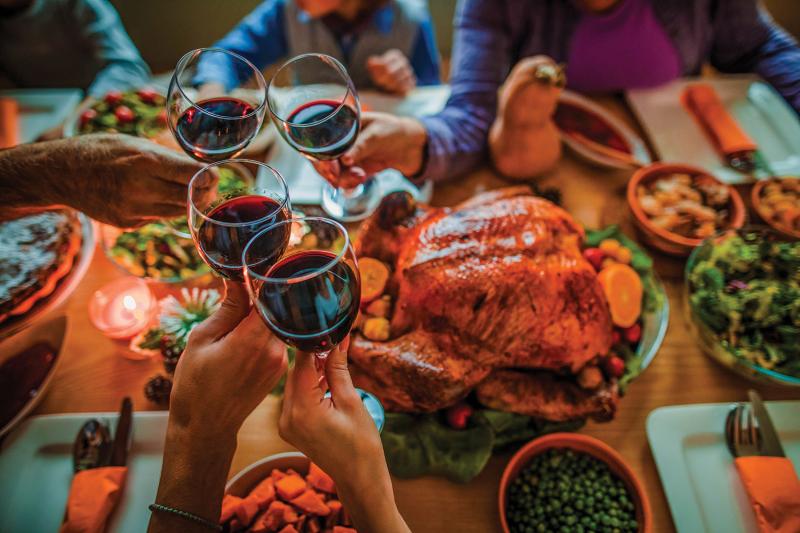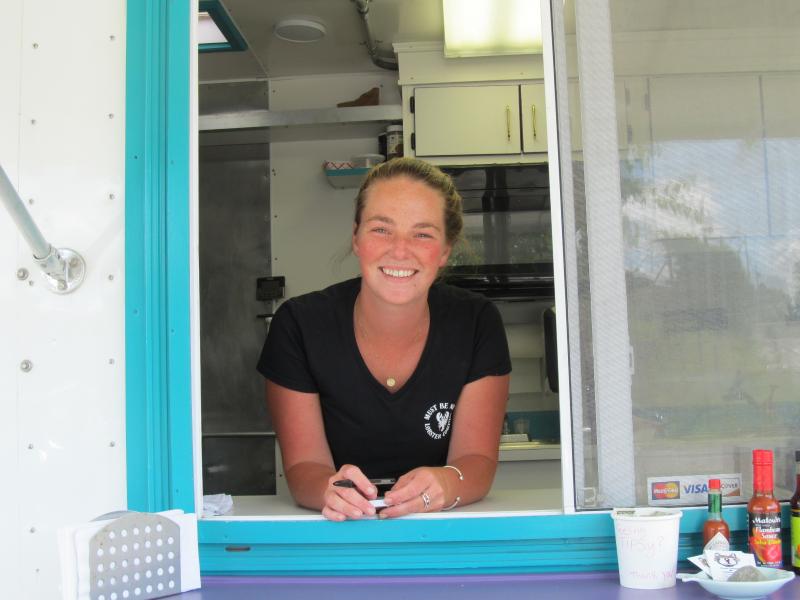|
Note: my story originally appeared on www.penbaypilot.com
APPLETON—Maine Cater, a recruitment company dedicated to serving New England’s food and beverage industry, has come up with an idea to provide local “restaurateurs, employers, job seekers, and FOH/BOH” with an economic lifeline during a pandemic that shows no signs of stopping. Husband-and-wife team, Daryle and Orianna Degen launched Maine Cater in Camden in 2017 as a way to supply temporary employees to restaurants suffering from immediate gaps in employment. “We’ve both worked in the hospitality industry all of our lives, said Degen. “I used to be a relief chef in England and Scotland helping short-staffed restaurants for years, but when I moved to Maine, I realized there wasn’t any service that could quickly plug in a chef or a server or a bartender into an existing restaurant if the restaurant was short-staffed. Given Orianna’s background in FOH (front of house) management and mine in BOH (back of house) management, we decided to start our own company.” Since the COVID-19 virus hit, the couple left their Camden location and now operates remotely out of their Appleton home. In addition to providing the public a job board for the restaurant industry in all of new England akin to Craiglist or Indeed.com, the couple recently announced a community service arm to their job board. Whereas before, employers looking to post on Maine Cater’s Job Board could do so for free. But now, adjusting their model, it requires a $25 fee— the majority of which goes back into a fund to assist workers and restaurants. “Employers are already paying $25 to some of the larger corporations such as Craigslist in order to post jobs, so why not support a local company?” said Daryle Degen. “And in return, we invest the funds they paid and put it back into the industry to help other businesses and restaurant workers.” As PenBay Pilot reported two months after the COVID-19 virus shut down indoor dining for the majority of Maine’s restaurants and bars in a story, “Open? Close? Adapt to permanent Takeout?” the restaurant industry was left flapping in the wind. The Paycheck Protection Program was not a huge success and came with too many strings attached to be workable for many businesses. A dire prediction from restaurateur John Stowe, owner and chef of Rockland’s Rustica, interviewed for that article is now coming true. “...The reality is the pivotal moment won’t take place this summer; it’ll be after the winter, where you’ll see more restaurant closures,” said Stowe. “So, if locals love their favorite restaurants, the best thing they can do is continue to go there, get gift certificates and continue to support them past the summer.” “To put it in a harsh reality, the restaurant industry is in a pretty bleak state,” said Degen. “Without any help from the federal government, I don’t foresee many places surviving, especially with all of the state restrictions on top of that. It’s making it impossible for restaurateurs to survive the pandemic as we enter the ‘Dead Season’ in January. That’s typically where restaurants rely on the income they made in the summer and many of them didn’t have that safety net this year.” When a restaurant’s margins are razor-thin, it trickles down to the employees. “A lot of servers have also left the industry, where they were just not making enough,” said Degen. “It’s an industry not known for being able to offer the best wages and benefits.” It’s more than that: it’s a Perfect Storm of economic disparity. Seventy percent of restaurant servers are female and yet, women have been disproportionally hit the hardest with the pandemic, particularly those with small children and who live in districts where schools are doing remote learning. Giving Back Through A Worker Fund and a Restaurant Fund Maine Cater spells out clearly in a blog post titled Community Service what they intend to do with the employer job listing fee. “The $5 from the $25 will go towards credit card processing fees and job board software upkeep, and the remaining $20 will go into the chosen fund account,” states the blog. To kick-start the fund accounts, Maine Cater will put $500.00 of its own money into each fund. They will keep track of which employers in New England states and regions are posting the jobs. So, if a Midcoast restaurateur pays the $25 fee, the $20 will go into a fund for Midcoast servers and restaurants. “For the Worker Fund, we will be offering several types of assistance,” said Degen. “One is a disaster relief assistance, where if a worker is struggling to pay his or her rent, or is facing eviction, we will be building up that fund in order to give back to that individual. The other way we’ll distribute funds is to issue gift certificates to workers so they can dine out or buy take out and feed their families. We can also use those funds to drop a large tip to a particular restaurant, whether it’s one or two thousand dollars, which the workers can split. There are a number of ways we can give back to them, directly.” The Restaurant Fund focuses on the economic health of local restaurants. Maine Cater will supply restaurants with gift cards to their own restaurant that either Maine Cater gives away to the public or the restaurateur hands out to guests. The funds can also be pooled to give away to hotels with attached restaurants for a “Weekend Getaway’ package. “We can buy gift cards to multiple restaurants so that restaurants paying into the job post funds end up helping one another stay afloat,” said Degen. “It creates an ecosystem of restaurants supporting other restaurants.” The other benefit to restaurants when customers use a gift card, say $50, is that the customers often spend well above the gift amount, increasing the ticket average for the restaurant. A General Fund is also being built with the purchase of a resume package and job listings ($290) to directly benefit food banks, rent or disaster relief assistance for industry workers, and larger prize giveaways like weekend getaway packages, etc. Currently, this system is not open to receiving general donations from the public; it’s all through the economic investment of restaurateurs. Maine Cater aims to launch this new program in mid-December. To follow their updates visit: https://www.mainecater.com
0 Comments
A traditional family Thanksgiving may be ideal for some, but for people who don’t have family in Maine, may have strained family relations, or just don’t feel like slogging through holiday travel, there’s another way.
Friendsgiving, a decidedly un-traditional potluck dinner with friends, is how to put a fun and stress-free spin on the holiday, while staying put in Maine. Internet sleuths pinpoint the origin of the term Friendsgiving around 2007 or 2008 to reflect an informal gathering of a ragtag crowd, e.g., the child-free, the “holiday orphans,” the coworker, neighbor or single friend who is going to be stuck with a frozen Swanson’s Hungry Man turkey dinner and Netflix. It’s all about the camaraderie, and how we get through these long Maine winters. The best part about Friendsgiving is that it’s not beholden to stringent tradition. It can be a lunch or dinner gathering. It can even be a few days before Thanksgiving, so people can get their “friend fix” before joining their families on November 28. How To Plan The Menu (And Divvy up the Dishes) According to the Rules of Friendsgiving, the host planning the party is the one cooking the bird and the gravy. The most reliable friend has to bring the hors d’oevres. The rest of the guests take the pressure off the host by bringing a side dish, a dessert, and/or a specialty cocktail. The Food Network has some ideas on this. From mac and cheese to potato chip stuffed potatoes, this is the ideal time to ditch the canned cranberry and green bean mushroom casserole. Supporting Maine’s lobster industry and the lobstermen still out there hauling this time of year is a great way to add in a side dish to Friendsgiving and here are some great appetizer ideas from the Maine Lobster Festival. Friendsgiving Rituals The rituals of Friendsgiving are meant to be silly and fun or meaningful to the group. It can be a themed event, like a Tom Hanksgiving or a Friends-themed Friendsgiving with Rachel’s English trifle. Arriving in your own custom headwear is highly encouraged, using materials from a craft store. Others just all agree to arrive in their pajamas and slippers. Gather everyone around for the Macy’s Thanksgiving Parade which starts at noon, and take a shot every time one of the hosts says “fun” or “wow.” Here are the rules. For designated drivers, teetotalers or people adulting, do five jumping jacks instead. Board games are also a major feature of Friendsgiving as a way to loosen up guests who don’t know each other very well. Some folks even like to give thanks ahead of time by volunteering together at Heroes 4 Hunger at 6 a.m. or band together to help serve Thanksgiving dinner to others before going back to the host’s house and continuing the celebration. Once the Friendgiving meal starts, there’s still no need to be formal. Gather plates and pillows and eat on the floor watching old favorite movies or the Big Game. Your mother would be horrified, but she’s not going to be there. Or cover the table with butcher block paper and give everyone crayons. You can even put up a homemade poster and let your friends write what they are thankful for. There’s even a few public Friendsgivings being hosted around Maine for strangers who want to become instant friends. Here are more tips to make your Friendsgiving a festive one! Kay Stephens can be reached at [email protected] BELFAST--She works hard for the money, that’s for sure. Captain Sadie Samuels catches lobster all week on her own boat, FV Must Be Nice.
The afternoon I’d stopped by her new lobster shack, located right on the Harbor Walk in Belfast, she’d already been up at 4 a.m. to go haul. “The bait guys were late this morning, like 5 a.m., so I got a late start,” she admitted. Yet, by 10 a.m., when most of America is only an hour into their work day, Sadie got off the boat, and headed for her lobster shack, Must Be Nice Lobster Co., to begin churning out lobster and crab rolls all day to hungry customers. And even when her day was done, at 6 p.m., she said she was still going to cook and shuck the lobsters that she’d caught today for tomorrow’s lunch menu. Sadie is 27 and has been lobstering since she was a child. “I got my student license when I was seven, and then my commercial license when I was 14, which is when I got my first boat,” she said. “I was fishing off my dad’s boat, and he allowed me to fish some of his gear, like 20 traps. I wanted more but my dad was like ‘you can’t take all of my gear; you need your own boat.’ So I got a tiny little outboard with an electric hauler.” Even though she has lobster fished all of her life, Sadie’s father insisted she go to college, but even while she was attending college in California, earning her degree in printmaking, the sea still called every summer. After graduation, she came back to Maine and began lobster fishing full-time. As for the boat’s name, it’s a cheeky reference to how the lobstering life is perceived by those who don’t work in the industry. “My sister and I came up with it,” she said. “We were like, ‘what will people say when they come down to the boat?’” “We don’t know for sure what the future of lobster fishing is going to look like, so, I’ve been expanding a bit,” she said, of the lobster shack. “For the last three years I was selling my lobster rolls at the United Belfast Farmer’s Market, and recently found this mobile truck, so this was the next step. I kind of jumped on the opportunity. For this year, yeah, it’s a lot. But, that’s what’s winters are for.” PenBay Pilot readers may remember Sadie from a recent story on Susan Tobey White’s series painting “Lobstering Women of Maine.” (See related story). Sadie said it has been interesting to see customer reactions when they realize she is both the captain that supplies the lobsters as well as the lobster shack owner. “Some people look at me in disbelief, and say to me, ‘you don’t look like you could do that [haul lobsters for a living].’ But, I want little girls to see me and say to themselves, ‘I can be a fisherman like her!’” The best part about Sadie’s shack apart from her infectious smile, is how affordable she makes her product. She offers $16 lobster rolls and $12 crab rolls, all freshly picked. And here’s something you never see: she also offers mini rolls for half that price. A crab roll mini costs the same as a McDonald’s quarter pounder with cheese. “I just figure a lot of the time young kids can’t afford the full roll, so that makes it affordable for them, or for people who just want to try the taste of it,” she said. Must Be Nice is open from Wednesday through Saturday 11 a.m. to 6 p.m. near Heritage Park on the Harbor Walk until October. Stay in touch with their Facebook page. Kay Stephens can be reached at [email protected] |
The Killer ConvoThis blog is a is a killer roundup of all arts, entertainment, brewery & distillery, food trucks, happy hour happenings in the Midcoast Maine. Feel free to email me anything about Midcoast arts, entertainment & the creative economy. Archives
June 2021
Categories
All
|




 RSS Feed
RSS Feed